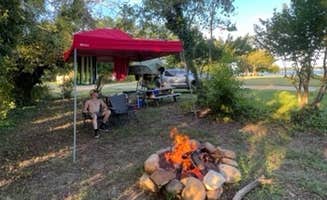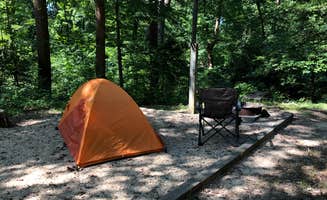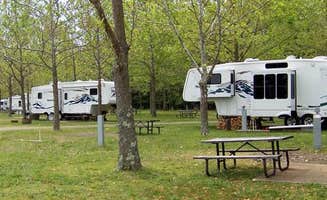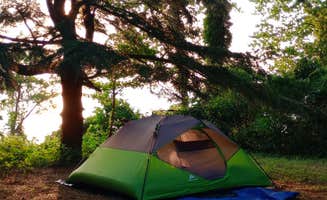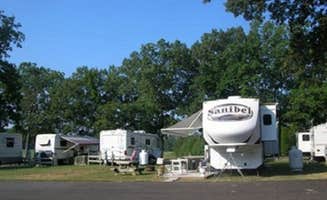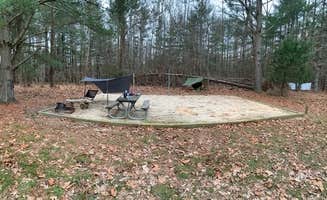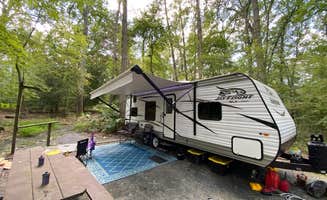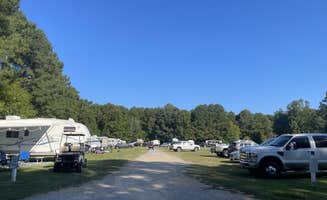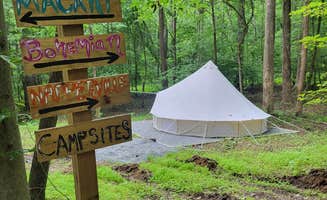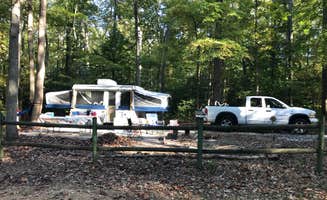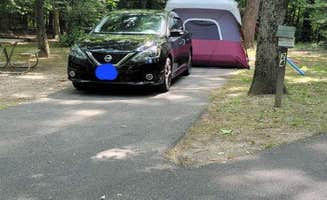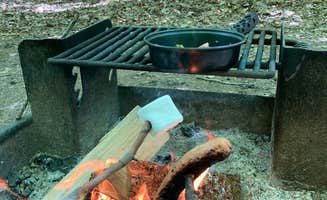Camping near Chaptico, Maryland centers on waterfront sites along the Potomac River and Chesapeake Bay tributaries, with elevation ranging from near sea level to only slight rises. Summer temperatures typically reach the mid-80s with high humidity, creating conditions where insects thrive near waterways. Frost-free camping season extends from mid-April through mid-October, with fall offering more comfortable temperatures and fewer biting insects.
What to do
Fossil hunting at beaches: Westmoreland State Park's unique geological features make it popular for prehistoric discoveries. "We came from Pa/De and wanted to look for sharks teeth. It was beautiful here so we decided to stay the night," shares Sara A. about her Westmoreland State Park experience.
Fishing and crabbing: Many waterfront campgrounds offer direct access to productive fishing spots. At Endeavor Point, "the pier was perfect to fish or crab off of and the beach had great views of the sunrise," according to camper Ally S.
Hiking shaded trails: Forested areas provide welcome relief from summer heat. Cedarville State Forest offers "very serene and peaceful views. Which is surprising due to the forest's location," as Justin G. noted about his camping experience during a storm.
Paddling opportunities: Several campgrounds rent kayaks or canoes for water exploration. "There is also boat rental a short walk down the trail from the campgrounds," mentions Ben G. about Pohick Bay Campground.
What campers like
Private, wooded sites: Many campgrounds offer secluded spots with natural separation. At Cedarville State Forest, campers appreciate "very well maintained, nice sites that aren't right on top of one another. Multiple loops for groups or individuals," as Donald G. describes.
Clean facilities: Well-maintained bathhouses are consistently mentioned. Nurse N. noted about Cedarville: "Restrooms were clean, closed daily for cleaning between 1 pm - 3 pm. Two showers were included but didn't use it so not sure about pressure or heat."
Waterfront access: Direct water access represents a significant advantage. At Matoaka Beach Cottages, "Our spot was very private and you could see the bay and hear the waves," according to Courtney K.
Winter camping options: Some parks remain open year-round. "Went in March 2018 for my birthday, when it was still VERY cold, but had a wonderful time. The beaches and trails seem so much more peaceful and untouched this time of year," mentions RL about Westmoreland State Park.
What you should know
Insect conditions: Mosquitoes, ticks, and biting flies can be problematic, especially near water. At Cedarville, Ben J. warns: "LOTS and LOTS of ticks. I got one, but my wife and dog got about a dozen each. Just bring tweezers."
Site drainage: Low elevation areas may hold water after rain. At Point Lookout State Park, "Tulip Loop has full hookups which was great, but the sites are basically in a swamp... with all the standing water they'd be everywhere!! We didn't have much cover from trees, so we were in the sun most of the time," reports Buck P.
Seasonal closures: Many facilities operate limited schedules. "The museum was still closed because of covid, I guess. No internet access at the campsite, but could get it if you were a few feet away from the Loop," notes another Point Lookout review.
Cell coverage gaps: Service can be limited in rural areas. "We have AT&T and had two bars pretty consistently," notes Nurse N. about Cedarville, while Buck P. mentions Point Lookout is "a complete dead spot for Verizon anyway. Not good if you're working while camping."
Tips for camping with families
Look for scheduled activities: Some parks organize regular events. "They informed us that they had a scavenger hunt for the kids going all weekend, they had an outdoor movie scheduled for Friday night, a campfire story time scheduled for Saturday night and crafts scheduled for Sunday morning," explains Ben G. about Pohick Bay.
Choose loops based on amenities: Different camping areas offer varying levels of facilities. In Caledon State Park, campers note basic facilities: "Wood for sale at the site for $4 honor system. Porta pottie right next to wood pile."
Visit playgrounds: Play areas provide children with activity options. At Cedarville, "The park has a great play ground right off the main parking lot for kids to play on as well as a few bathrooms."
Consider weekday visits: Lower attendance means more space and availability. As RL advises about Westmoreland: "If you're anything like me, traveling for peace and quiet and solitude, I highly recommend Sunday and Monday nights if you have flexibility with jobs etc. It was SUPER quiet during my stay."
Tips from RVers
Prepare for varied site conditions: Levelness varies significantly between campgrounds. At Thousand Trails Harbor View, Nick E. notes: "Would give it 4 stars for the hookups and friendly staff but we were welcomed to our site with pile of dog poop that had been left there. Gravel site pad could definitely use some maintenance and fresh material added."
Site spacing considerations: Many campgrounds place RVs close together. "All the sites are very shady, which certainly comes in handy in the Virginia heat. They are also very close together—our slide was almost touching our neighbor's slide," warns Em M. about Harbor View.
Site selection strategies: Outer loops often provide more privacy. At Point Lookout, "most of the sites on the outside of the loop were private and long driveways. Inside the loop were more open."
Length restrictions matter: Not all parks accommodate larger rigs. "We have a pop up and had to navigate around a tree that would have been very difficult for larger rigs," explains Nurse N. about Cedarville site selection.


